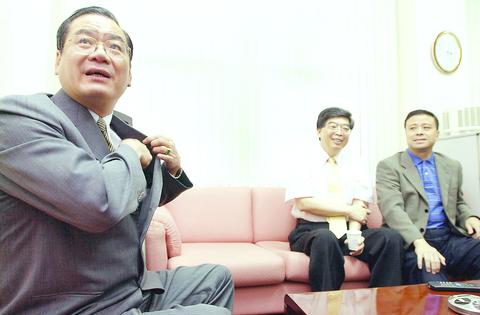Leaders of opposition legislative caucuses agreed yesterday to a special legislative session being held to review financial bills seen as key to the nation's financial reform.
The legislation, which has been proposed by the Cabinet, failed to pass before the closure of the legislative session last Wednesday.
But lawmakers representing the KMT, People First Party and New Party said yesterday that the session could only be held -- for constitutional reasons -- after President Chen Shui-bian (

PHOTO: GEORGE TSORNG, TAIPEI TIMES
"The bills to be considered in the provisional session have to be urgent and important ones," said Cheng Yung-chin (
Chen said yesterday he respects the decision of the legislature and would do his part to make the special session possible.
The dates of the provisional session are expected to be decided in negotiations between the ruling and opposition parties.
The bills targeted by the Cabinet include the enactment of the Financial Holding Company Law, the Statute for the Establishment and Management of the Financial Reconstruction Fund, the Securities and Finance Management Law and amendments to the Business Tax Law, the Insurance Law and laws regarding deposit insurance.
During a visit to Legislative Yuan speaker Wang Jin-pyng (王金平) on Thursday, Premier Chang Chun-hsiung (張俊雄) expressed his wish that lawmakers could pass the bills early by holding a special session, rather than waiting until the next session which is set to open on Sept. 18.
According to the Constitution, in addition to being held at the request of the president, a provisional session can also be held if initiated by lawmakers with the endorsement of at least a quarter of the legislative body.
Also on Thursday, Chen promised he would issue an official statement asking for a provisional legislature session, if the legislature considered this a more proper method to handle the matter.
Wang, who has always believed the session should be held at the request of the president, reiterated yesterday that the legislature must take a cautious attitude on the issue.
"Unless there are major national affairs to consider, the legislature will lack the legitimacy to hold a provisional session," Wang said.
Opposition lawmakers, meanwhile, said Chang should explain to the public the importance and urgency of the bills before the special session is held.
In addition, the Cabinet should put forth a complete list of its urgent bills that are to be considered in the upcoming provisional session, if there are other ones in addition to the six aforementioned bills, the lawmakers said.

MAKING WAVES: China’s maritime militia could become a nontraditional threat in war, clogging up shipping lanes to prevent US or Japanese intervention, a report said About 1,900 Chinese ships flying flags of convenience and fishing vessels that participated in China’s military exercises around Taiwan last month and in January last year have been listed for monitoring, Coast Guard Administration (CGA) Deputy Director-General Hsieh Ching-chin (謝慶欽) said yesterday. Following amendments to the Commercial Port Act (商港法) and the Law of Ships (船舶法) last month, the CGA can designate possible berthing areas or deny ports of call for vessels suspected of loitering around areas where undersea cables can be accessed, Oceans Affairs Council Minister Kuan Bi-ling (管碧玲) said. The list of suspected ships, originally 300, had risen to about

DAREDEVIL: Honnold said it had always been a dream of his to climb Taipei 101, while a Netflix producer said the skyscraper was ‘a real icon of this country’ US climber Alex Honnold yesterday took on Taiwan’s tallest building, becoming the first person to scale Taipei 101 without a rope, harness or safety net. Hundreds of spectators gathered at the base of the 101-story skyscraper to watch Honnold, 40, embark on his daredevil feat, which was also broadcast live on Netflix. Dressed in a red T-shirt and yellow custom-made climbing shoes, Honnold swiftly moved up the southeast face of the glass and steel building. At one point, he stepped onto a platform midway up to wave down at fans and onlookers who were taking photos. People watching from inside

Japan’s strategic alliance with the US would collapse if Tokyo were to turn away from a conflict in Taiwan, Japanese Prime Minister Sanae Takaichi said yesterday, but distanced herself from previous comments that suggested a possible military response in such an event. Takaichi expressed her latest views on a nationally broadcast TV program late on Monday, where an opposition party leader criticized her for igniting tensions with China with the earlier remarks. Ties between Japan and China have sunk to the worst level in years after Takaichi said in November that a hypothetical Chinese attack on Taiwan could bring about a Japanese

STREAMLINED: The dedicated funding would allow the US to transfer equipment to Taiwan when needed and order upgraded replacements for stockpiles, a source said The US House of Representatives on Thursday passed a defense appropriations bill totaling US$838.7 billion, of which US$1 billion is to be allocated to reinforcing security cooperation with Taiwan and US$150 million to replace defense articles provided to the nation. These are part of the Consolidated Appropriation Act, which the US House yesterday passed with 341 votes in favor and 88 against. The act must be passed by the US Senate before Friday next week to avoid another government shutdown. The US House Committee on Appropriations on Monday unveiled the act, saying that it allocates US$1 billion for the Taiwan Security Cooperation Initiative